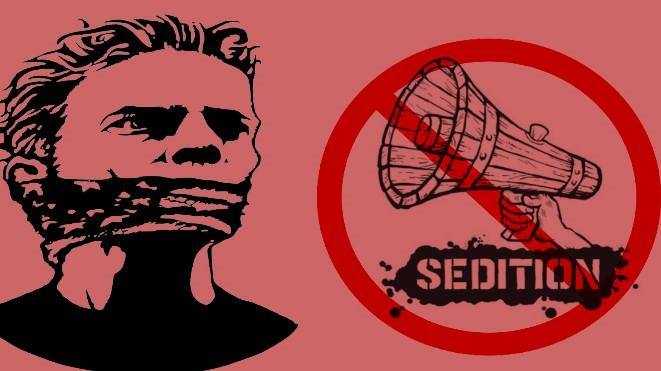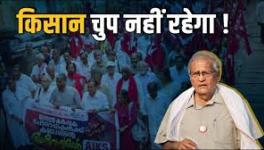Sedition Law: State of Permanent Emergency?

Representational image. | Image Courtesy: The Leaflet
In yet another case of silencing free speech through the use of sedition laws, two FIRs were filed against prominent journalist Vinod Dua for criticising the central government’s handling of Delhi riots. The FIRs, filed by local BJP leaders, allege that Mr Dua incited hatred and violence towards the Prime Minister, and his government. Both the Delhi High Court, for the FIR registered in Delhi, and Supreme Court, for the FIR registered in Himachal Pradesh, have granted a stay on the arrest order while hearing Mr Dua’s plea seeking quashing of the FIRs. The author here examines the use of sedition laws on dissenters and critics of the government during the COVID-19 lockdown, in what he calls the imposition of a permanent emergency.
————
Recently, the apex court on July 7 granted interim protection to Mr. Vinod Dua, a leading journalist, charged with sedition due to his critique of the Government’s mishandling of the COVID-19 outbreak.
While hearing Mr. Dua petition for quashing of the FIR lodged against him, the Apex Court bench led by Hon’ble Justice Uday Umesh Lalit, directed the Himachal Pradesh Police to file a status report of the ongoing investigation within a week, to ascertain whether the FIR filed, was only to harass the senior journalist for airing views unpalatable to the Government.
Post lockdown, we have not only seen a spike in the number of COVID-19 patients, but another concern has re-surfaced which is weakening and undermining the fourth leg of our democracy.
Freedom of speech and expression, a cornerstone of the Indian democracy, has been put to a constant and continuous threat with the use of an archaic colonial law. The law on sedition, which is embodied in Section 124 A of the Indian Penal Code, 1860 (IPC), exists 73 years after independence, eroding the independence of the media, now more than ever. Section 124 A was inserted to the IPC during the colonial rule, to keep in check the growing turmoil of Indian masses against the British Raj. Since then the section has undergone multiple amendments, only to become more stringent and thwart the voice of dissent.
Section 124A of the IPC in its present form, reads “Whoever, by words, either spoken or written, or by signs, or by visible representation, or otherwise, brings or attempts to bring into hatred or contempt, or excites or attempts to excite disaffection towards, the Government established by law in India, shall be punished with imprisonment for life, to which fine may be added, or with imprisonment which may extend to three years, to which fine may be added, or with fine.“
Sedition is a non-bailable offence and punishable with minimum imprisonment of up to three years to a maximum of life term, along with payment of fine. This law has been persistently misused by governing parties to suppress unpalatable views, dissenting opinions, and condemnation of government actions and/or policies. Even though chances of conviction in such cases are a rarity, it has served as an effective tool of harassment and intimidation, wielded to silent dissenters.
The present government, like the ones before it, is no different. Recently Mr. Nityanand Rai, the Minister of State for Home Affairs, on being asked whether the colonial law would be repealed, said in the Rajya Sabha that “there is no proposal to scrap the provision under IPC dealing with the offence of sedition. There is a need to retain the provision to effectively combat anti-national, secessionist and terrorist elements”.
This is despite the judiciary’s consistent upholding of every citizen’s right to fairly and justly criticize the inactions and inadequacies of the Government. The Supreme Court of India, in a landmark judgment of Kedar Nath Singh v. State of Bihar (1962), had ruled that: “… citizen has a right to say or write whatever he likes about the Government, or its measures, by way of criticism or comment, so long as he does not incite people to violence against the Government established by law or with the intention of creating public disorder.”
The demand to repeal the law on sedition is not new and has been advocated since pre- independence. Mahatma Gandhi in 1922, after being charged with sedition by the British Government for an article published in the local magazine had said “Section 124A, under which I am happily charged, is perhaps the prince among the political sections of the Indian Penal Code designed to suppress the liberty of a citizen”. J Nehru, democratic India’s first Prime Minister, had termed the draconian law as “obnoxious” and “highly objectionable” and had observed that “the sooner we get rid of it the better”.
Unfortunately, India even after being independent for 73 years has failed to repeal the law on sedition as ruling parties continue to use it as a weapon of suppressing dissent. India has been a recent witness to the unprecedented use of the sedition law during lockdown, when the law was used to mute voices questioning the failure of the Government and lack of preparedness while imposing lockdown.
This repeated and unscrupulous use of the sedition law has re-opened an essential debate; whether the law on sedition should be abolished or whether the voice of dissent will be left at the mercy of the ruling government. Ironically, even the United Kingdom, our colonial father, has abolished their law on sedition in 2010 following the recommendation of Britain’s Law Commission Report. Despite this, India continues to carry the colonial baggage of misery and oppression to its citizens. Unless India finds a way to put an end to this instrument of abuse, its citizens fundamental right remains in a state of permanent-emergency.
(The author is an advocate practicing at Delhi High Court and Supreme Court of India. Views expressed are personal.)
Get the latest reports & analysis with people's perspective on Protests, movements & deep analytical videos, discussions of the current affairs in your Telegram app. Subscribe to NewsClick's Telegram channel & get Real-Time updates on stories, as they get published on our website.
























